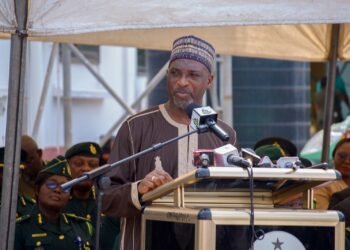Dr. Antwi-Boasiako Amoah, the deputy director of the Environmental Protection Agency has iterated the need for a concerted budgetary allocation towards climate change mitigation in the country.
Ghana has put forward mitigation and adaptation actions in its Intended Nationally Determined Contribution. The country will need $22.4 billion to finance.
With this, government is to cough up $1.6 billion including existing public investments. Some sectors have already submitted proposals for foreign aids.
Speaking at a workshop held at the climate information services in Kumasi, Dr. Amoah, however, believes Ghana’s reliance on donor funding is not resourceful.
“We’ve already submitted quite a number of proposals to different funding sources… I know energy has a number of proposals out there, forestry has a number of them. Recently, they got one of them approved.
“You cannot depend on donor funding to drive home some of these important issues especially when you connect these actions with developments.
“If truly we see these actions as development, then there should be a high national budgetary interest to be able to actually make sure that the money that is needed is mobilized. There should be some conscious effort by national government or systems to support otherwise we may not be able to achieve what is expected”.
He further revealed that the Authority will complete a document on the investment plans to help the sectors mobilize funding.
“Work on the investment plans is almost completed. It’s yet be published”.
The workshop was under the theme, “Mainstreaming climate information for resilient Agricultural systems to support Sustainable Development in Ghana.”
Prof. Leonard Kofitse Amekudzi, the Chancellor of the College of Science at KNUST, was of the opinion that the recent spate of sporadic weather have made the meeting even more crucial.
“At first, issues regarding housing affects the entire population in diverse way. It has become a very important thing because of the alarming nature, and some of the things that have really increased these fears have been increasing precipitation… I believe we’ve gotten over one hundred millimeters of rain, just only in a day, on campus. This is not what we need for a rain-fed agriculture”.
“The goal is to build resilient agricultural systems in the face of the changing rainfall and temperature patterns. This workshop provides a great opportunity to learn”.
Meanwhile, a new UN report says the world needs to rapidly raise investment in early warning systems for extreme weather events.
Over the past 50 years, recorded disasters have increased five-fold, thanks in part to climate change.
The study warns that one in three people on Earth are not adequately covered by warning systems.
The numbers of people in need after natural disasters could increase by 50% over the next decade.
The State of Climate Services 2020 has been produced by experts from 16 international agencies and financial institutions, and coordinated by the World Meteorological Organization (WMO).
Over the past 50 years, it says, some 11,000 disasters involving weather, climate and water-related hazards have occurred claiming two million lives and causing more than $3.5 trillion in economic losses.
In 2018, around 108 million people sought help from international agencies to cope with natural disasters.



















